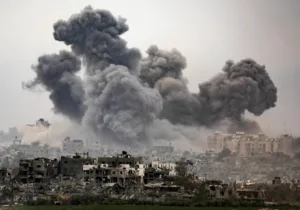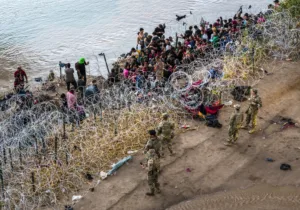Fallout continues over freshmen New York Congresswoman Alexandria Ocasio-Cortez’s (AOC) comparison of detention facilities on our border with Mexico. In her Instagram live video, she insisted:
The US is running concentration camps on our southern border, and that is exactly what they are… If that doesn’t bother you…I want to talk to the people that are concerned enough with humanity to say that “never again” means something.
AOC has not walked back her rhetoric. Far from it, she continues to double-and tripled-down. And while she’s insisted that she carefully used the term “concentration camp” rather than “death camp” in order to acknowledge the differences between the two, the context proves otherwise. By asserting that the detention activities on the border violated our pledge of “never again” and that the Trump administration is “fascist” for running the detention centers, she was clearly invoking the Nazi regime. “Never Again” was always a promise to prevent another holocaust—it was never about simply saying no to mass incarceration. And those actual fascist concentration camps of the twentieth century always involved something a bit more terrible than the mere mass confinement of a people group. While it’s true that not all concentration camps were death camps, nearly all featured intentionally horrific conditions, forced labor, varying degrees of planned starvation, summary executions, and systematic abuse of inmates. They also generally served as transit camps, temporary holding facilities before shipment off to fully qualified extermination centers. In any case, in the “triple-down” linked above, she also asserted that death camps are merely “the final steps of [a] phase” that begins with concentration camps.
I am not, here, interested in debating the specific conditions on our southern border. In fact, I really can’t, given it seems impossible to find either media reports or reliable testimony from across the political spectrum that even agree on what the conditions are. This is its own crisis. What I am interested in is commenting on why comparing what’s going on down there to the Holocaust is foolish both historically and strategically. For what it’s worth, my objections apply to nearly any comparison made between the Holocaust and a current atrocity—real or perceived.
First, comparing the detention facilities to the Holocaust is historically stupid. While the Holocaust targeted a range of people groups, the Jews were the primary intended victims. It matters that while not all victims were Jews, all Jews were victims. The Holocaust was the intentional, planned extermination of the Jewish people. It was not simply an act of mass murder—the slaughter of numerous people. Nor was it, strictly speaking, simply a genocide. Genocidal actions are aimed at a singular people group, to be sure. But they tend to be aimed at exterminating a particular people from a particular territory. Of course, both mass murder and genocide are utterly abhorrent. But what happened to the Jews—or what was intended to happen to them—was further up the spectrum and required a new concept. The Nazis would not have been satisfied with the death of every German Jew, nor every European one. They wanted the absolute annihilation of the Jewish people. All Jews everywhere were to die (and, no, the Madagascar Plan isn’t an exception; conditions there were intentionally to be incompatible with supporting any significant number of Jews at any time and, eventually, none at all). To compare detention facilities—in which no one is formally intended to be harmed—with the Holocaust is morally perverse.
It’s worth mentioning that some attempted comparisons between a given atrocity and the Holocaust hit closer—if only incrementally—to the mark, even if they fail in the end. For instance, some might draw comparisons between abortions performed on pre-born children with catastrophic medical conditions to Nazi practices of euthanasia involving physically or mentally handicapped children. Another might compare racial practices in apartheid South Africa to Nazi race theory. One exhibit in South Africa did precisely this. It displayed an image of a German doctor measuring a young girl’s nose with a specially-designed caliper in order to discover whether she was Jewish. This image was juxtaposed to another image of a white South African doctor administering the “pencil test” to a young boy. The pencil was to be stuck through the child’s curly hair. If it fell out, the child was proved to be white. If it stuck, the child was revealed to be black.
But however striking—and instructive—certain similarities are, there remain obvious differences between methods and intentions. Apartheid was a despicable system institutionalizing the social, economic, and legal suppressions and debasement of blacks. While this regularly involved much worse—from arbitrary imprisonment to murder—the objective was never mass annihilation, per se. With the Nazis, of course, it was. All Jews everywhere. The abortion of children with medical abnormalities is closer to warranting Nazi comparisons, especially when considering the horrific toll that has been taken on children with Down syndrome. In the United States, upward of 67 percent of children diagnosed with the condition are aborted. In Denmark, famous for its rescues of Jews in World War II, that rate is a staggering 98 percent. Even, however hesitant I am to admit it, one ought to discern a difference in general intent between those obsessed with an honest—if horribly misguided—concern for the “quality of life” of a child and the categorically different Nazi dismissal of “life unworthy of life.” Of course, there is cause to question the deeper motives of medically selective abortions, but, at their “best”, they are done in the interests of preventing the suffering of the child. The Nazis were concerned only for the purity of the race. Admittedly, the distinction is, in practice, slight—and doubtfully makes any difference at all to the child.
But beyond historical inaccuracy, making comparisons to the Holocaust is strategically stupid. First of all, it’s an unnecessary distraction. Even following the terrible images of drowned children on the Rio Grande, too much public interest is focused more on defending or condemning AOC for her concentration camp remarks—and parsing the difference between concentration camps and death camps—instead of asking important questions, fixing real problems, and negotiating ways to both secure our border and humanely deal with the human crisis at that border. AOC has foolishly allowed the important focal point of the conversation to shift, well, to her, as well as to secondary—and frankly distracting—issues. One cost of this is that it allows those who simply do not care about the humanitarian issues to ignore them and focus instead on debating with her about terms. If she intended to help those struggling on the border, she failed.
Similarly, it’s also strategically stupid because making wild comparisons to the Holocaust has become the trump card of our age, shutting down discourse on real issues instead of informing and shaping it. Who can argue against death camps? Once invoked, the Holocaust analogy limits where you can position yourself in the debate—either you are a perpetrator, a bystander, or a rescuer. For all the reasons stated above, most events short of a holocaust are not so black-and-white.
But that, I suppose, might just be the point. AOC is foolish, but she does not appear to be an idiot. She is savvy, strategic, and skillful in shaping debates. Similar to what Dan Strand proposed in his reflection on AOC, I suspect that her invocation of the Holocaust is revelatory of her true aspirations. Anxious to play a role in a great battle pitched between good and evil, human beings have a tendency—one that seems to be growing in an age that has increasingly unmoored itself from the Transcendent—to cast themselves in a theatrical light and to seize for themselves a grand and self-admiring role in the drama of the world.
It is not, perhaps, so much that we want to perceive those we oppose as evil, but that we need to—all in order to adopt for ourselves the great role of rescuer. We want to be heroes. In an age in which we have allowed ourselves to be confused as to where true heroism lies, we arrogate for ourselves the capacity to decide on our own. In our fever to matter, we are not so much concerned with whether our fight is real or whether we make any progress in righting historic injustices. We are content with moral self-pleasuring, even if it does not bear any real fruit.
AOC is fond of saying she is all about speaking truth to power. That’s well and good. But in addition to adjudicating whether or not they are actually telling the truth, I suppose another test of whether one is a true or false prophet can be discerned in whether, even in the midst of accomplishing nothing at all, the prophet seems to be enjoying themselves a bit too much. If so, and while I might be a bit cynical here, the verdict seems clear.
Marc LiVecche is the editor at large for Providence, and the McDonald Visiting Scholar at the McDonald Centre for Theology, Ethics, and Public Life at the University of Oxford.
Photo Credit: Display at the Auschwitz concentration camp, via Wikimedia Commons.







 Sponsor a student for Christianity & National Security 2024
Sponsor a student for Christianity & National Security 2024